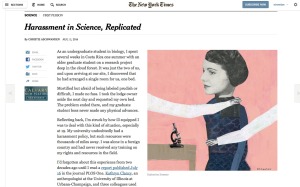A piece in the New York Times recently discusses sexual harassment while scholars are out in the field conducting research.
A topic worth of discussion in its own right, I can see this being a solid introductory read for undergraduate students interested in how gender and science meet. A lot of the literature in that area centers of feminist technology, seeing the underlying sexism in scientific depictions (i.e., the sperm is active while the egg lays in waiting, and so on), and, of course, access to and participation in science and engineering broken-down by gender (sort of like a version of the Matthew Effect, only with women falling out of the pipeline to professional scientist/engineer, perhaps it should be called the Molly Effect or something like that).
At any rate, the piece covers a number of important issues such as power/gender dynamics while in the field, the issue of “sleeping arrangements” while conducting research at non-local venues, as well as the reality that when sexual harassment looms in university-based research activities the matters are often settled internally (rather than in a public forum).
These are matters worth of more public discuss, especially on college campuses, and, to my mind, the sooner the better (perhaps, even in high school)

yes and that has the added problem that the long-term employees learn to dig in and wait-out any administrative changes of program/process regardless of the correctness/fit of the solutions being offered.
how to institutionalize reflexivity?
LikeLike
That seems — to me — to be a viable alternative to business as usual, which seems to be some variation on “just let them retire” (i.e., the attrition game)…
LikeLike
in the humanities/ethics students are often taught a whole host of social/political offenses to call out but never really how to address them in ways that fix the problem/system.
we need a forum/seminar on whistle-blowing (especially with people who have successful experiences/records) , my own experiences have always ended up with me eventually being out of the organization and ever more marginalized.
maybe we could start a kind of online how-to manual/workshop?
LikeLike
Agreed: I can see ample ethics training related to the conduct of the research itself, as well as the researcher-subject relationship, but very little about the researcher to researcher relationship. It is a place to start this difficult discussion.
On Tue, Aug 12, 2014 at 1:53 PM, Installing (Social) Order wrote:
>
LikeLike
be good to lay out for students how to formally/legally address such offenses within whatever systems they find themselves.
LikeLike